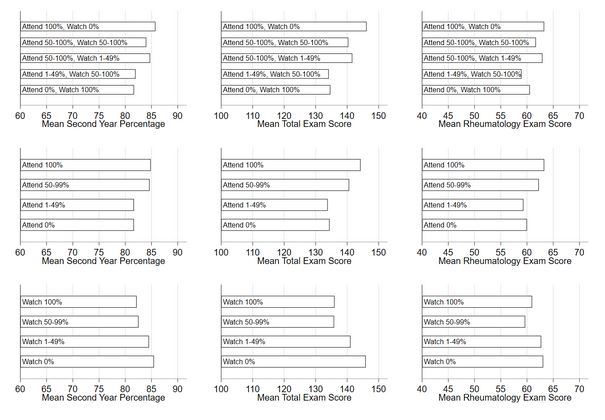Session Information
Session Type: Abstract Session
Session Time: 10:00AM-10:50AM
Background/Purpose: We present a comparison of student’s outcomes with remote video-based learning versus lecture attendance in pre-clinical medical students during a musculoskeletal curriculum, thus allowing insight to optimizing educational formats for pre-clinical medical students. Our purpose was to assess academic outcomes (Rheumatology exam, overall course exam, and overall second year rank) among second year medical students in a musculoskeletal course at the University of Nebraska Medical Center College of Medicine (UNMC COM) varying by percentage of remote learning versus attended lecture for this musculoskeletal block. As remote learning becomes increasingly common during the ongoing COVID-19 pandemic, it is prudent to understand how this may impact medical student’s acquisition of pre-clinical knowledge of Rheumatology.
Methods: Our study is a prospective cohort study conducted at UNMC COM during the M-ID-640 Musculoskeletal, Dermatology & BLS Core from March 23, 2015 to April 10, 2015. We compared the outcomes of 126 second year medical students during this time period. Outcomes were compared based upon confirmed variations in percentage of class attendance and remote lecture viewing. We directly took lecture attendance and had automated record of remote viewing of the material using Echo 360. Our outcomes of interest were the Rheumatology subject exam score, M-ID-640 (course) overall exam score, and the second year cumulative GPA. Investigators reviewed the attendance and echo 360 viewing data and assigned each student to one of the following groups 1) Attend 100%, Watch 0%; 2) Attend 50-100%, Watch 50-100%; 3) Attend 50-100%, Watch 1-49%; 4) Attend 1-49%, Watch 50-100%; 5) Attend 0%, Watch 100%. The outcomes or these groups were compared by regression analysis.
Results: Increased lecture attendance when compared to remote viewing of the lectures, correlated with improved scores in all three of the measured academic outcomes (overall second year percentage, mean overall course grade and mean rheumatology exam score.) There was no statistical difference in undergraduate GPA’s among the cohorts that would help explain the outcome differences we observed.
Conclusion: Increased lecture attendance had a positive correlation with multiple scholastic measures in a pre-clinical musculoskeletal course at the UNMC COM when compared to remote video learning. As remote learning is becoming increasingly commonplace, particularly in the setting of the current COVID-19 pandemic, careful consideration of medical school curricula delivery should be undertaken to best achieve academic success and knowledge acquisition in pre-clinical medical students.
 Figure 1 Outcomes 2nd year percentage, Mean total exam (overall course) and mean rheumatology Exam Score.
Figure 1 Outcomes 2nd year percentage, Mean total exam (overall course) and mean rheumatology Exam Score.
To cite this abstract in AMA style:
Widener B, Cannella A, McBrien S. To Attend or Note to Attend; The Medical Student’s Dilemma [abstract]. Arthritis Rheumatol. 2020; 72 (suppl 10). https://acrabstracts.org/abstract/to-attend-or-note-to-attend-the-medical-students-dilemma/. Accessed .« Back to ACR Convergence 2020
ACR Meeting Abstracts - https://acrabstracts.org/abstract/to-attend-or-note-to-attend-the-medical-students-dilemma/
